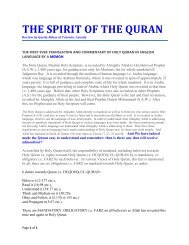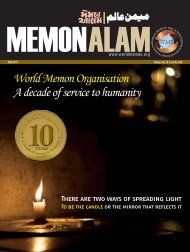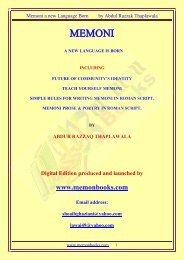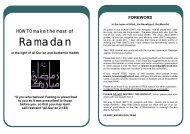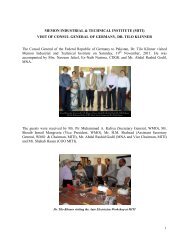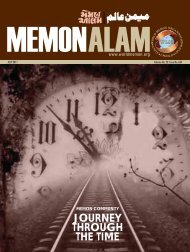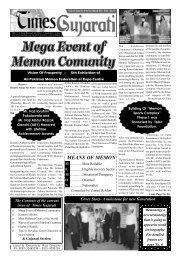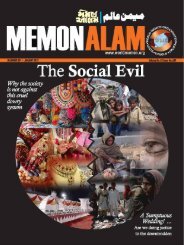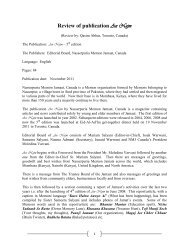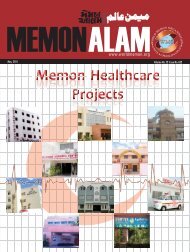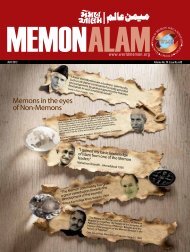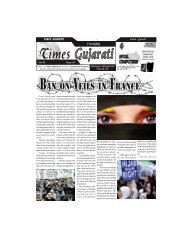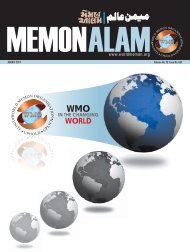IMMORTAL PERSONALITIESof the society to remove your difficulties.Even a bit of carelessness on the part of anyone will be tantamount to pushing the communitytowards a set-back to that extent”.Adamjee Haji Dawood, the founder of the<strong>Memon</strong> Educational & Welfare Society,uttered these words on 7th October 1934,while speaking at the first meeting of theSociety.Adamjee was born on 30th June 1880,at Jetpur in Kathiawar; his father HajiDawood Baig Mohammed and his motherHanifa Bai used to call him by ‘Adamjee’instead of Adam and, therefore, he waswidely known as Adamjee. Though Adamjeewas keen about education, he couldnot go beyond fourth class in Gujrati. In1895, at the age of 15, he went to Promatown of Burma, and started his career asan employee of Mr. Saleh MohammadGhaziani. His salary was only Rs. 25 permonth but after completion of one year hisemployer, in appreciation of his honestyand work, gave him a prize of Rs. 125 andan embroidered cap.In 1913, Adamjee started his firm inRangoon under the name of Adamjee HajiDawood & Co. In 1914, a branch of thisfirm was opened in Calcutta. This firm progressedwell and afterwards was convertedinto a limited company with a capital of Rs.5,000,000.Adamjee entered industrial field in 1923.He established a match factory in Rangoon.He was director of Rangoon Electric TradingCompany and Scandia Steam NavigationCompany. He took Burma Fire andMarine Insurance Company under his ownmanagement and was taken on the ManagingBoard of Bank of India Limited. Hewas a leading businessman of jute and rice.He was elected the first President of BurmaIndian Chamber of Commerce, establishedin Burma. Later, he became the Presidentof this Chamber. This was his first publicactivity.After the death of his father, when hecame back to Rangoon he found thatHakim Ajmal Khan, a great leader of theMuslim community, had arrived there inconnection with the funds for Tibia College.Adamjee donated a fairly large amount tothe College fund. He also gave a generousamount to Burma University. During thesame period he started to give scholarshipsto Muslim students in his individual capacity.He was elected president of Rangoon<strong>Memon</strong> Jamat in which capacity he servedfor several years.His main line of business was jute bags,which were generally imported fromCalcutta. So, he decided to establish a jutemill in Calcutta, and he was the first everMuslim to start a jute Mill. His Scottish8and Marwari rivals created many hurdlesin his way but at last he successfully startedconstruction of a mill in December 1927at Blur, about 5 miles away from Calcutta,with a huge capital of Rs. 8,000,000. Themill started its production in December1928.Haji Dawood Baig Mohammed, father ofAdamjee, had opened a small dispensary inJetpur and was planning to convert it into alarge hospital but due to his demise this programmecould not materialize. Sir Adamjeepurchased a large plot of land in Jetpurnear station and constructed ‘Haji DawoodHospital’. He provided one lac rupees formaintenance of the hospital. He took activeinterest in Public welfare projects andextended considerable material support toAnglo-Gujrati School of Calcutta.Heavy rains in 1928 throughout Gujratand Kathiawar resulted in floods, whichclaimed several human lives and colossalloss to property. Some stalwarts establisheda fund named ‘Gujrat Kathiawar Rail RahatCommittee’ and went to Mr. M.K. Gandhiand requested him to recommend an honestand enthusiastic man who could managethe affairs. Mr. Gandhi named Mr. AdamjeeHaji Dawood as the proper person.Therefore, a delegation headed by Mr. TriBhuvan Hira Chand, a leading businessmanof Bombay, reached Calcutta and requestedMr. Adamjee to accept the responsibilitiesas Chairman of the Relief Committee. Despitehis pre-engagements Sir Adamjee acceptedthe responsibilities and successfullyhandled the job. He also donated generouslyto the Committee.Addressing a conference on the topic ofeducation, he emphasized the importanceof learning and knowledge. He focused attentionon the rapid progress in science andlearning. He cited Russia’s efforts to developthe country. Even in India, which is consideredto be a backward country, Parsis havemade tremendous progress. Hindus are alsoworking hard to achieve material progress.He deplored that the majority of the <strong>Memon</strong>sremained semi-literate. The communitywhole-heartedly responded to the call ofMr. Adamjee, and they became unitedunder his bold and dynamic leadership.<strong>Memon</strong> Educational and Welfare Societywas formed in 1933 to promote knowledgeand learning in the community.The welfare activities of Adamjee werenot confined to the <strong>Memon</strong> communityonly, he did his best for everybody. In 1934,he collected funds for earthquake victimsof Bihar and Quetta under the auspices ofthe Society and very efficiently handled therelief activities by creating a volunteer force.Adamjee had an unshakeable faith inthe leadership of the Quaid-e-Azam. Notonly Adamjee but also the whole <strong>Memon</strong>Community had regard for the Quaid evenbefore the well-known <strong>Pakistan</strong> Resolution.The <strong>Memon</strong>s in Calcutta felicitatedthe Quaid in 1936 in a large gathering ofMuslims. In those days, the Quaid-e-Azamwas known as Mr. Jinnah. Mr. Adamjeeaddressed the gathering as the leader ofthe community, and from that moment hestarted taking interest in politics.He was also actively interested in thepromotion of sports. He was patron of thewell-known Mohammedan Sporting Clubof Calcutta and did his best for its progress.In recognition of his status in trade andindustry and selfless services he renderedfor the welfare of the masses, the BritishGovernment awarded him knighthood in1938.He reached Jetpur again in 1940 in connectionwith the marriage of his youngerson. There he built a school named ‘SirAdamjee Muslim High School’. Moreover,with a view to preserving the memory ofhis late mother he purchased a building andestablished ‘Hanifa Bai Kanyashala’ (GirlsSchool). He also formed a private <strong>Organization</strong>and got it registered as ‘Sir AdamjeeHaji Dawood Educational and MedicalSociety’.In 1940, the Quaid-e-Azam emphasizedthe need for a press for projecting thepoint of view of the Muslim League. Heestablished a press fund in which Adamjeewas the first man to send his contributiontelegraphically. Adamjee served the MuslimLeague in a befitting manner from 1936to 1948. During this period he had closecontact with the Quaid-e-Azam, and he wasone of his reliable colleagues.The newly born nation <strong>Pakistan</strong> confrontedheavy odds in its early days. Only anominal amount was received by the Stateout of total allocation. The dispute over thebalance left the exchequer empty of fund. Inthose days Adamjee came to Karachi, theQuaid-e-Azam had a meeting with him incamera, only Mr. Ghulam Mohammad, thethen Finance Minister, was there. Duringthe deliberations, Admjee put forth veryuseful suggestions, which became the basisof a viable economy of this nascent state.In January 1948, to consult him on mattersrelating to the formation of the StateBank of <strong>Pakistan</strong>, the Quaid invited him.In those days Adamjee was a heart patient.The meeting was arranged at upper storeyof the building and there was no arrangementof elevator. He had to walk upstairswhich aggravated his heart trouble. Col.Shah immediately gave him initial treatment.He was rushed to his residence inSaddar, but he died the next day on the 27thof January 1948.MEMON ALAM FEBRUARY 2012
IMMORTAL PERSONALITIESBARRISTER ABDULSATTAR WALIBorn with a silver spoon in his mouth toa very rich family, A.S. Wali was the first<strong>Memon</strong> Barrister. All his life he remainedan idealist and reformist. Charities of hisfather were very well known and BarristerWali inherited both the wealth andgenerosity of his father. He spent lavishlyon the causes, which were dear to hisheart. He was a fluent orator in <strong>Memon</strong>y,Gujrati, Urdu, English and Persian.Eminent leaders like Mr. M.A. Jinnah andMrs. Sarojini Naidu sought his companyat public functions.The weekly “<strong>Memon</strong> Sudharak” waspublished under the editorship of the lateBarrister A. Sattar Wali, who played avery vital role in bringing reforms andawakening to the <strong>Memon</strong> community.This weekly also published regular columnsto pave the way for holding <strong>Memon</strong>conference. The magazine also inspirednew writers in Gujrati on subjects likesocial evils, and harshest possible criticalarticles were published very boldly. BarristerWali traveled extensively throughoutKathiawar to see for himself the socialand educational conditions of the <strong>Memon</strong>community. He realized the need to publisha magazine for campaigning reformsand, as such, he started the publicationfrom Bombay in 1929, the leadership ofthe community at that time was mostlyhereditary. “<strong>Memon</strong> Sudharak” stronglydeplored this system and advised the communitymembers to elect leaders throughballot. In 1931, when Barrister Wali raisedthis issue in the <strong>Memon</strong> conference andmoved a resolution against the existingsystem, there was a major uproar. At theintervention of Seth Adamjee, the resolutionwas withdrawn. The contribution ofBarrister Wali was very great and unforgettablefor the reforms of the community.Elsewhere, in the book his services tothe cause of the <strong>Memon</strong>s, Muslims andIndians, generally have been described. Inshort, Barrister Wali was one of the rareleaders of the community whose servicesunfortunately could not be utilizedbecause of his advanced views on reformsand adoption of democratic system inrunning the organizations. Not havingsucceeded in his mission he became frustratedand after migration to <strong>Pakistan</strong>, hedied unknown, un-honored and unsung.SETH AHMADDAWOODSeth Ahmad Dawood, was one of the topbusinessmen and industrialists of <strong>Pakistan</strong>.He was born in 1905 and has playedsuch an important role as a <strong>Memon</strong> thathis services cannot be excluded from<strong>Memon</strong> history. He was the founder ofDawood Foundation through which heestablished Dawood Engineering Collegein Karachi. In the early days some of thesubjects taught in this College were notbeing taught in any other university/collegeanywhere in <strong>Pakistan</strong>. Even after nationalizationof this College he providedcasual financial aid to the institution. TheFoundation runs schools and other charitableinstitutions.He was the founder trustee of Al-ShifaEye Hospital to which his Foundation hascontributed more than Rs. 15 million. Hewas the main founder of United <strong>Memon</strong>Jamat and has always been keen to bringall the <strong>Memon</strong>s on one platform. Unfortunately,during the Bhutto regime, he waskept under house arrest for several monthsfor just being an outspoken industrialist.He left <strong>Pakistan</strong> for a couple of years duringwhich period he did exploratory workin USA in the field of oil exploration. Hewas a very daring industrialist with a foresight.In East <strong>Pakistan</strong>, due to labor unrestnobody was prepared to buy the PIDCProject Karnaphuli Paper and ChemicalMill, but Ahmed Dawood dared and continuedto run it profitably till the emergenceof Bangladesh. His main missionthat every able bodied man in <strong>Pakistan</strong>should be provided with a bicycle to makehim mobile has not yet been fulfilled.The Dawood family started from humbleorigins when Ahmed Dawood begantrading in pre-partition India and waseventually joined by his brothers. At partition,the family opted to move to <strong>Pakistan</strong>,where the new nation created ampleopenings and opportunities for businessand industry. The family thus made thetransition from business to industry,first establishing Dawood Cotton MillsLimited in 1952. The industry expandedrapidly. With the realization that the onlyway to maintain continuous growth andenhance reputation was to expand internationally,the first international officewas established in Manchester, England,operating under the title ‘Dawood (England)Limited’. Simultaneously, seniormembers of the family, in a bid to ensurethat the education of all successive generationsbe given the utmost importance,sent their children to England to pursuetheir studies.As such, nearly the entire secondgeneration has graduated with universitydegrees from England, from where theyproceeded to the United States to studybusiness at graduate level. The familycan boast of having graduates of the bestuniversities like Oxford, Manchester, LondonSchool of Economics, Strathclyde,McGill, University of Western Ontario,Harvard, Northwestern and Columbia.The family has more MBAs than anyother family in <strong>Pakistan</strong>. The Dawoodsdecided to expand further. In 1959, thefamily purchased Burewala Textile Mills,a cotton textile mill with its own ginningfactory, and in 1969 established Dillon,which manufactured nylon and syntheticyam. Their last textile venture was LawrencepurWoolen Mills.The strategy of diversification wasmarked by the setting up of DawoodHercules Chemicals (Urea fertilizer), followedby Transpak (baby food, toothpaste,toothbrushes and other consumergoods), Dawood Yamaha (Motorcycles),Dawlance (refrigerators and microwaves),Descon Engineering (construction), andMeiji Biscuits.A move into the financial sector wasthe next step. It was put into effect withthe establishment of Central InsuranceCompany (in-house insurance), BRRCapital Modarba (leasing under the Islamicmode of financing), BRR SecoundModarba (working capital finance), andEquity International Modarba (venturecapital funding as a joint venture withIFC and Robert Flemings). All threeModarbas have since been merged intoone, namely BRR International Modarba.Other concerns include OrientInsurance Company, and the latest,Dawood Leasing Company Limited, ajoint venture among the four brothersand other renowned financial institutionsof <strong>Pakistan</strong>. Prior to the establishmentof Bangladesh, the Dawood familyalso owned and managed KarnaphuliMEMON ALAM FEBRUARY 2012 9



